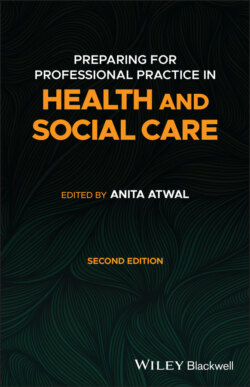Читать книгу Preparing for Professional Practice in Health and Social Care - Группа авторов - Страница 13
Clinical Reasoning
ОглавлениеClinical reasoning shares many of the same ambitions as EBP. Higgs et al. (2004, p. 191) suggest it ‘provides the means of examining the relevance of knowledge to specific practice situations’. Traditionally it can be described as a process that combines a specific body of specialised knowledge with cognition, metacognition (thinking about thinking), and contextual considerations. There are a number of theories about how that cognition is defined using terms such as hypothetic deductive reasoning and pattern recognition. These are theories are about how clinical reasoning is determined not about what it actually is.
There is a similarity here with the basic definitions of EBP. Both health paradigms, that is clinical reasoning and EBP, look at the relevance of knowledge when applying it to the individual patient. Both have separate development traditions and literature but there is an overlap. EBP and clinical reasoning ask that knowledge is assessed so that as health practitioners it can be applied effectively. In order to assess propositional knowledge, we have to be able to use critical faculties to appraise it. Critical appraisal of propositional knowledge requires some understanding of research method, because this is how a great deal of health literature is generated. Beyond that, ensuring that the assumptions embedded in scholarship are made obvious is an important skill, and one that comes with practice and reflection.
To assess professional or craft knowledge, the heuristics (mental shortcuts) and biases to which all humans are vulnerable need to be uncovered to assess their appropriateness. This requires reflection on practice, more usefully employed using one of the many established models of reflection.
Personal knowledge occurs when other types of knowledge are employed and absorbed and experienced in practice (Fish and Coles 1998, p. 44). The healthcare worker views this acquired knowledge as his or her own. It is based in the values and ethics of the individual and is often difficult to articulate. When comparing this personal knowledge to an espoused knowledge of practice, using a reflexive debate, learning can take place.
These three types of knowledge are all distinct and require skill and thought in order to embed within practitioners or students. Reflection and reflexivity are important ways to not only understand and ‘own’ knowledge for practice but also to improve and, even more crucially identify, ineffective practice.
We have defined professionalism and discussed a wider definition of knowledge. Common methods of applying that knowledge into professional practice – EBP and clinical reasoning – have been discussed. It has been suggested that reflection and reflexivity are important methods to uncover the complex knowledge used in practice. The following section examines reflection and gives case studies to help the reader deepen their understanding.
